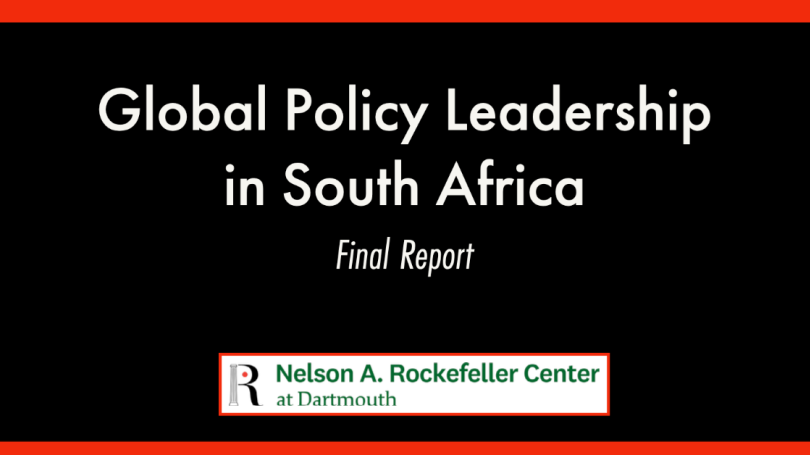
- Public Policy
- Leadership
- Funding
- News & Events
- About the Center
Back to Top Nav
Back to Top Nav
Back to Top Nav
Back to Top Nav
The students of Public Policy 85: Global Policy Leadership completed ten weeks of study at Dartmouth and two weeks of field study in South Africa in Fall of 2022. Below is the introduction to their policy brief. You can download their full report here.
South Africa is a country of contradictions. Wealthy businessmen of all races often live feet from abject poverty. Multinational businesses happily open up shop alongside a liberation party that governs haphazardly. Many who committed horrific crimes under apartheid walk freely among their victims — in the name of reconciliation. It is a country that bears its scars proudly and talks about them freely, but presently seems unable to do much to heal them.
This policy memo reflects the efforts of the Dartmouth College undergraduate students of PBPL 85, "Topics in Global Policy Leadership," who were tasked with studying racial reconciliation in South Africa, making policy recommendations for promoting reconciliation, and finding lessons for the U.S. in the Rainbow Nation. For the purposes of this memo, we define racial reconciliation as a goal, an aim characterized by a society where race is no longer a predominant line of division, where economic and social hierarchies and opportunity are not shaped by race, where racial, cultural, and ethnic diversity are celebrated and accepted, and where past racial injustices have been both acknowledged and substantively addressed.
Written after ten weeks of intensive classroom study and two weeks of field work in Johannesburg, Pretoria, and Cape Town, this memo lays out our findings. Following a brief history, major policy sections of this memo reflect a chronological approach to achieving racial reconciliation, in which the reforms outlined in one section "unlock" further policies that would have previously been untenable. Section I outlines ideas for building trust in the public institutions of South Africa's fledgling, but progressive, democracy. Section II focuses on unleashing South Africa's economic potential. Section III explores ways to ensure universal, equitable distribution of public services. Envisioning a new South Africa, Section IV ties these three threads together, examining how they can collectively create bridging social capital and address past (and ongoing) grievances to help the country heal. Finally, Section V will offer recommendations on how the United States can learn from South Africa in attempting to address its own racial divisions.
We are confident that our recommendations are a roadmap toward a more prosperous, peaceful, and reconciled South Africa. At the same time, however, we are conscious of the limitations of our approach. Reconciliation is not a lever that can simply be pushed from "off" to "on" with the right mix of regulations and reforms. As one 2019 article in the Economist dryly notes, "If the production of reform blueprints were the key to wealth, South Africa could be the world's richest country." 1 We are also aware of our own biases; 12 American students, nearly all of whom are white and none of whom are black, cannot fully understand the experiences of South Africa (or, for that matter, of the United States). Ultimately, the question of racial reconciliation is one of culture, society, and time. The suggestions contained herein may help to move it along, but it is up to all of the people of the Rainbow Nation to achieve it. And if racial reconciliation can be achieved here — and we believe it can — then as Claudelle von Eck told us, "South Africa can be a blueprint for the world." 2
1 "Why is it hard for foreign investors to be bullish on South Africa." The Economist , December 12, 2019.
https://www.economist.com/finance-and-economics/2019/12/12/why-it-is-hard-for-foreign-investors-to-be-bullish-on-south-africa.
2 Conversation with Claudelle von Eck, December 5, 2022.